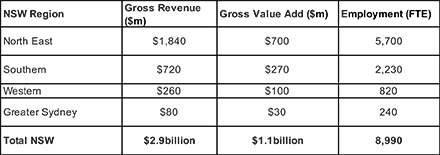Supply of nation-building hardwood timber is critical to the NSW economy, providing thousands of jobs and skills right along the supply chain, according to a new Ernst + Young Report. Source: Timberbiz
Science-based election policies must safeguard local timber supply to meet the rising demand for wood products and support our regional communities.
The Report shows (see table above) that the NSW hardwood timber industry is vitally important to the State’s rural and regional economy, contributing $2.9billion in revenue, adding $1.1billion to NSW’s Gross Domestic Product and employing almost 9,000 people.
“We need to set out the facts. Hardwood timber is a sustainable, renewable and essential input into the construction, agriculture, mining and energy sectors,” Timber NSW CEO Maree McCaskill said.
“Contrary to self-serving announcements from the WWF and other conservation groups, Australia faces strong and rising demand for nation-building timber supplies. The NSW timber industry is in fact a significant and growing part of the NSW economy and has had this central role in our regional communities for more than a century.”
Ernst + Young’s Report, commissioned by the Commonwealth-funded North East NSW and South East Forestry Hubs, tracks the hardwood timber industry’s economic impact beyond direct forest management and harvesting activities, seen primarily in rural areas, to the supply and servicing of downstream sectors including manufacturing, building construction, transport, energy and mining.
Hardwood timber generates jobs all along its supply chain, beginning with forest management and log harvesting and haulage, to primary and secondary processing, timber transport, product manufacturing, and wholesaling. Installing finished wood products into people’s homes and community infrastructure also keeps thousands of tradies employed throughout Australia.
“It’s the durability, strength, range and natural appeal of NSW hardwood timber makes it highly sought after for flooring, decking, furniture, cladding, building and fencing products,” Ms McCaskill said.
“It is also relied upon to provide essential infrastructure like power poles and marine wharves and jetties as well as the timber pallets upon which most other products are transported. The strength of this demand for hardwood timber is driving its increasing value.
“Opponents of the NSW timber industry fail to recognise that the strong and growing economic contribution of the industry is due to its central role in nation-building activities. New South Wales needs timber and importing it from less regulated countries is not the answer.
“The lesson post-pandemic is that self-sufficiency in critical supplies like timber is sound policy. NSW State Forests can and should be managed for their critical economic contribution, in harmony with their contribution to our communities, environment and biodiversity,” she said.
“We must safeguard local timber supplies and keep these jobs and skills in NSW.”






